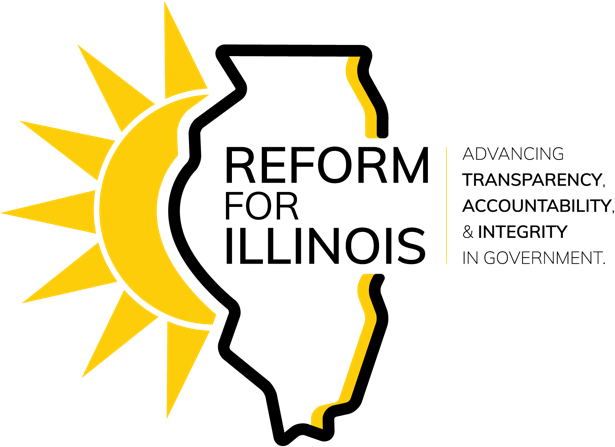ICPR was proud to kick off its Small Donor Democracy initiative with a forum at the DePaul University School of Law
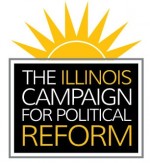 Dear ICPR Friends:
Dear ICPR Friends:
ICPR was proud to kick off its Small Donor Democracy initiative with a forum at the DePaul University School of Law on September 18 exploring how such programs can encourage more candidate and voter participation and reduce the impact of big money in politics.
Forum panelists included:
- Oak Park Village President, Anan Abu-Taleb
- Committee for Economic Development Advisor, Cindi Canary
- Columbia University Law School Legal Research Fellow, Carl Johnson
- Cook County Clerk, David Orr
- Better Government Association Policy Coordinator, Judy Stevens
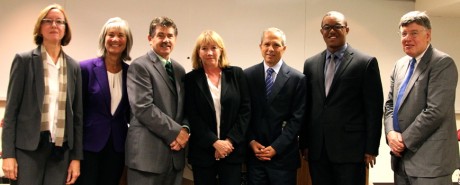
(From left to right: Judy Stevens – BGA, Susan Garrett – ICPR, David Orr – Cook County Clerk, Cindi Canary – CED, Anan Abu-Taleb – Oak Park Village President, Carl Johnson – Columbia University Law School, David Melton – ICPR)
The panel discussed the potential benefits of bringing such a system to Illinois to encourage more qualified citizens to run for local office regardless of their financial situation, promote greater voter engagement in campaigns and ultimately reduce the disproportionate influence of big money in our politics and government.
“Small donor democracy has the potential to open up our political system in Illinois to a whole new group of individuals who previously may have felt they had no point of entry into the process, given the funds and resources usually required to run for office successfully,” said ICPR Board Chair and former State Sen. Susan Garrett. “The implementation of such a system could inspire a whole new wave of grassroots funded candidates and donors who wouldn’t otherwise have gotten engaged in the process.”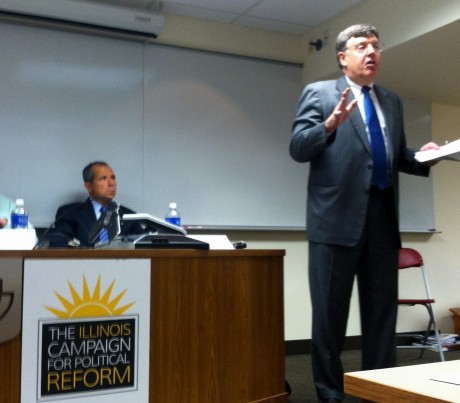
ICPR Executive Director David Melton said a small donor matching system could serve to reduce the influence of large donors and special interests.
“In a post-Citizens United world, so many citizens are feeling disillusioned with a political system dominated by millionaire and billionaire donors,” said Melton. “In a small donor democracy, we put power back into the hands of regular folks to make their voices heard about who t hey want representing them.”
hey want representing them.”
Judy Stevens of the BGA agreed that a small donor democracy system could not only limit the corrupting influence of money in politics, but could also encourage more participation and more diversity of candidates.
“In New York City, the first of many ethnically diverse candidates won with that kind of support,” Stevens said.
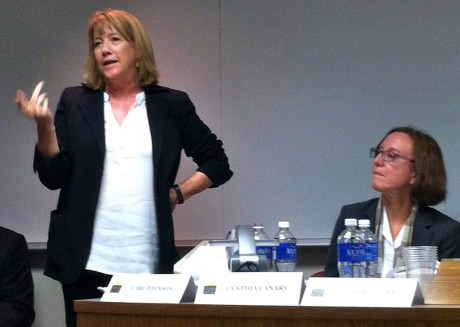 “This is an opportunity in the current landscape that we can really innovate, get people involved, and get maximum impact,” said Canary. “This has the potential of making elections far more competitive, so that they can actually be forums for ideas and debate instead of different funding streams driving issues.”
“This is an opportunity in the current landscape that we can really innovate, get people involved, and get maximum impact,” said Canary. “This has the potential of making elections far more competitive, so that they can actually be forums for ideas and debate instead of different funding streams driving issues.”
Clerk David Orr said the reform could face some serious opposition from lawmakers, particularly on the grounds that it could drive up some costs to the bodies that administer elections. “You know what? It sounds like a lot of money, but we can take back our government,” he said. “Big money makes it more difficult for your elected officials to represent you.”
Legal Researc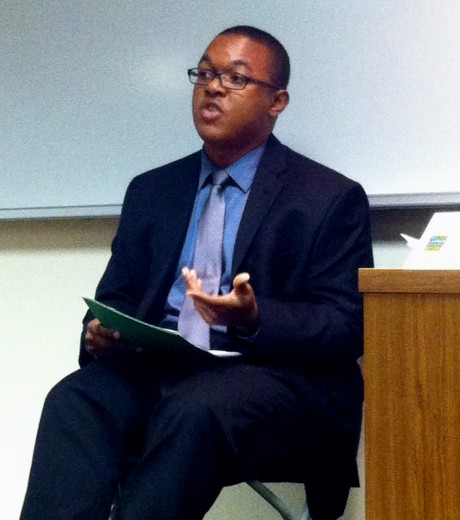 h Fellow, Carl Johnson, from Columbia University echoed that a central goal of Small Donor Democracy is to amplify the influence of the many, rather than the super-wealthy few. “If candidates can rely on average voters to fund
h Fellow, Carl Johnson, from Columbia University echoed that a central goal of Small Donor Democracy is to amplify the influence of the many, rather than the super-wealthy few. “If candidates can rely on average voters to fund
competitive campaigns,” he said, “it is much more likely they will be responsive to those voters as policymakers once elected.”
Oak Park President Abu-Taleb spoke to his own experience as a candidate, and how a small donor system might have changed it.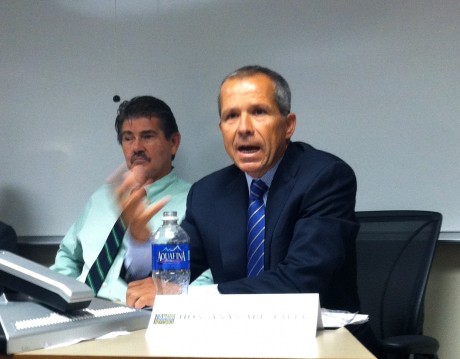
“The status quo nowadays is that in most localities there is usually some sort of an association that basically slates our elected officials,” Abu-Taleb said. “It’s very difficult for people like me, who have not been in government before, who have not had the blessing of such a machine to really be able to make a dent in that system.”
While there are costs associated with a small donor system, Abu-Taleb said, “The most expensive thing for a community is to give up the opportunity to have the best represent the community.”
Small Donor Democracy Facts
We’re excited to announce that ICPR is working with public officials and local activists in Oak Park and Evanston to explore enactment of pilot small donor matching systems for certain local elections.
Here are some key facts to know about Small Donor Democracies.
● In a small donor matching system, candidates who reach a certain level of funding in small contributions become eligible for matching funds – typically at a ratio that increases the impact of those donations.
● Small Donor Democracy has been a staple of municipal elections in New York City for more than 20 years and also has been implemented in a number of other U.S. municipalities and states.
● For example, mayoral candidates in New Haven, Connecticut receive $50 per contribution for contributions of $25 or greater and a 2-1 match for anything less. The New Haven Democracy Fund provides matching funds up to $125,000 to those candidates who meet a threshold of 200 contributions from distinct donors — all local residents — within the range of $10 to $370.
● The small donor match typically comes from public funds. However, given fiscal pressures on municipalities, ICPR is also exploring “hybrid” approaches that could draw upon privately raised “democracy funds” in addition to public funds.
Do you want to get involved in our Small Donor Democracy campaign? Send us a note at outreach@reformforillinois.org!
###
Back
